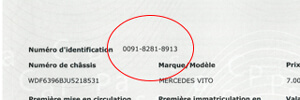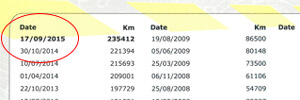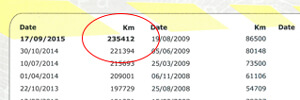The Car-Pass law is 20 years old

As its name suggests, the law aimed to curb fraudulent reversal of the odometer reading when selling used vehicles. This evil practice was widespread 20 years ago. It was estimated that 60 to 100,000 vehicles annually underwent a ‘rejuvenation cure’. This was obviously a problem for private buyers who overpaid for the used car of their dreams, and often faced high unexpected repair costs afterwards. This was not good news for the car industry either: their image suffered and it created unfair competition. Therefore, all actors involved, the automotive federations, the automobile clubs and the car inspection companies, sat around the table with the federal government. This resulted in the law of 11 June 2004 and the creation of the non-profit organisation Car-Pass in March 2006.
The law obliged companies in the car sector to report the odometer reading of the vehicles on which they carried out works to the central database of the non-profit-making organisation Car-Pass. Anyone selling a used vehicle (car and light van) is obliged, on pain of nullity of the sale, to hand the buyer a so-called Car-Pass, showing the odometer history. The buyer can thus ascertain the accuracy of the odometer reading. The first Car-Pass was delivered on 1 December 2006.
Michel Peelman, managing director of Car-Pass asbl, confirms: “Over all these years, Car-Pass has collected 310 million odometer readings from 26.5 million vehicles. This simple but efficient model has resulted in odometer fraud in Belgium being virtually non-existent. It now involves only about 1,500 cases a year. The success is mainly due to the unique form of public-private cooperation. The government lays down the rules and leaves the practical implementation to a non-profit organisation set up by the car industry itself. This has undoubtedly also ensured broad support within the sector.”
The low Belgian fraud rate is in clear contrast to the situation in other European Union countries. A European Parliament study in 2018 estimated that such fraud costs citizens €8.9 billion annually. Hence the call to our newly elected MEPs to quickly bring this issue back to the attention of the Commission.
Recent news
The Car-Pass law is 20 years old
Exactly 20 years ago, on 11 June 2004, the Chamber passed the ‘Act to curb cheating with vehicle odometer readings". Time for a retrospective and for an appeal to our new elected members of the European Parliament.
...
Car-Pass Annual Report 2023
For Car-Pass, 2023 was an excellent year; the number of Car-Pass documents requested increased by 7% and we processed 19.38 million mileage records, which is an absolute record, thanks in part to the influx of data from connected vehicles. Our figures also confirm that we are all driving our cars more again (+15.4% over two years). Unfortunately, a number of blatant fraud cases also came to light again last year.
...
Exchange of odometer readings between EU member states urgently needed.
More than 60 million used cars are sold every year in the EU and every year European consumers pay billions of euros too much because of odometerl fraud. The Belgium presidency is putting this issue back on the European agenda.
...
Car-Pass annual report 2022
The annual report of the non-profit association Car-Pass shows that 2022 was marked by a decrease in the number of requested Car-Pass documents but also in the number of cases of counter fraud, especially in imported used cars. Also positive was the increase in the influx of odometer readings, especially those of connected vehicles. This is despite the fact that some importers do not comply with their legal obligations in this respect.
...




